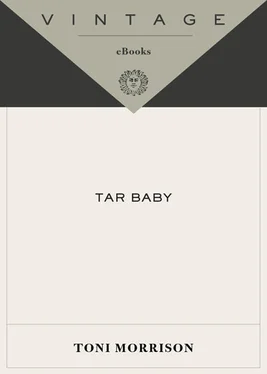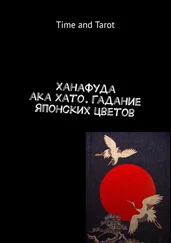Toni Morrison - Tar Baby
Здесь есть возможность читать онлайн «Toni Morrison - Tar Baby» весь текст электронной книги совершенно бесплатно (целиком полную версию без сокращений). В некоторых случаях можно слушать аудио, скачать через торрент в формате fb2 и присутствует краткое содержание. Жанр: Старинная литература, на русском языке. Описание произведения, (предисловие) а так же отзывы посетителей доступны на портале библиотеки ЛибКат.
- Название:Tar Baby
- Автор:
- Жанр:
- Год:неизвестен
- ISBN:нет данных
- Рейтинг книги:3 / 5. Голосов: 1
-
Избранное:Добавить в избранное
- Отзывы:
-
Ваша оценка:
- 60
- 1
- 2
- 3
- 4
- 5
Tar Baby: краткое содержание, описание и аннотация
Предлагаем к чтению аннотацию, описание, краткое содержание или предисловие (зависит от того, что написал сам автор книги «Tar Baby»). Если вы не нашли необходимую информацию о книге — напишите в комментариях, мы постараемся отыскать её.
Tar Baby — читать онлайн бесплатно полную книгу (весь текст) целиком
Ниже представлен текст книги, разбитый по страницам. Система сохранения места последней прочитанной страницы, позволяет с удобством читать онлайн бесплатно книгу «Tar Baby», без необходимости каждый раз заново искать на чём Вы остановились. Поставьте закладку, и сможете в любой момент перейти на страницу, на которой закончили чтение.
Интервал:
Закладка:
They thought about Isle des Chevaliers sometimes. He would say “ollieballen” and she would scream with laughter. She wrote two misleading postcards to Ondine and Sydney. Got a short, sorrowful, somewhat accusatory letter back which she refused to let sour her happiness. Her leave-taking had been difficult. She was dependent at last on that mulatto with a leer sent by Dr. Michelin as the new yard boy. The Streets seemed not to notice or mind her going. Only Ondine and Sydney were cut up about it. She promised to send for them as soon as they wanted her to, but she had to take this gig, she told them, and she left the two sullen and confused old people at the kitchen table, their hearts steeled against her leaving, even though her New York trip, she said, was vital if she were to arrange things so all three could live together. She couldn’t let them know who waited at the Hilton. Son and Jadine discussed their situation in Dawn’s apartment. Ondine and Sydney seemed unsure of their jobs, but no steps had been taken to let them go, it seemed. Son was less than sympathetic to Ondine’s plight because she had acted too shuffle-footed—keeping her white lady’s secret “lak it wuz hern” and loving her white lady’s baby “lak it wuz hern, too.” And much less sympathetic to Sydney because in thirty years he had not split Valerian’s skull. Eighty percent of both Sydney’s and Ondine’s conversation was the caprice and habits of their master.
“You still like that old man, don’t you?” Son asked her.
“Who? Valerian?”
“Yes.”
“He put me through school, I told you.”
“Nothing in return?”
“No. Nothing. Never made a pass, nothing.”
“And Margaret?” he asked. “How did she treat you?”
“Okay. She was more distant than he was, but she was nice to me. Nice enough anyway.”
“She wasn’t very nice to your folks,” he said.
“Actually, she was,” Jadine answered. “They both were. At least from what I could see of it. That’s why I was so took-out that day. I couldn’t believe it. They fought like we did in grade school.”
“Wild,” he said, thinking of rescue.
“Really wild.” Jadine let two of her fingers do the Charleston in the hair of his chest. “We’ll get rich and send for them and live happily ever after,” she said, and thought it was so, but not right this minute, not today, there was so much nestling to do. They had only two months left in the apartment, but they needed more time. Jadine habitually shaved herself all over like a fourth grade Girl Scout and he finally got around to telling her he wanted some body hair. But they needed time for it to grow. Much more time. Time for her to sketch him right for once. But why sketch when she could touch? Time to make a genuine paella; time for her to finish the macramé plant holder, for him to fix the dishwasher. They must have been in love—they never once turned on the television. They forgot to buy cigarettes or alcohol and they didn’t even jog in the park.
There wasn’t a permanent adult job in the whole of the city for him, so he did teenager’s work on occasion and pieces of a grown man’s work. He spoke to the men at the shape-up halls. The black men told him Baltimore. Everybody works on the docks in Baltimore. Or Galveston, or San Diego or New Orleans or Savannah. New York—not a chance. There was a little pilfering money—that was about all. Some small-time truckers gave him brute work, look-out work, and sometimes he dropped payoffs when asked. But none of it could hold his attention and one afternoon while he was helping a trucker unload boxes on Broadway and 101st Street, he heard a commotion in the traffic. A young girl with a shaved head and a small ring in her nostril was cursing a man right in the middle of the street. The man, who looked African or West Indian to Son by the innocent confusion in his face, stood watching her in silence. Two or three of his friends leaned on cars, looking elsewhere but obviously waiting for the finale. The girl was in jeans, platform shoes and a thin sweater. She had the voice of a sergeant and her language was nasty enough to be memorable. Cars honked at them before swerving into parallel lanes; pedestrians glanced and then pretended they weren’t there. Only Son and people in second-story windows gave them their undivided attention. It was beyond embarrassment. The girl’s face was as tight and mean as broccoli, her forefinger shot bullets into the pavement. But inside her narrowed angry eyes were many other eyes—some of them hurt, some brave, some just lonely hollow eyes, and her shaved head reminded Son of his sister. He listened to the abuse, the catalog of shame and rage until the man felt safe enough (his back-up team still leaned on the cars) to turn his back on her and walk away. None of which dulled the glitter of her nose ring or shut her mouth. She word-whipped him on down the street and probably would have followed him to make it stick except Son, made miserable by the eyes inside her eyes, went over and stood in front of her with his arms wide open. She looked at him with hatred older than lava.
“Come here,” he said.
She didn’t move, so he put his arms around her to shield her from the eyes of the second-story people and bank her fire. The girl bucked, but he wouldn’t let her go. “You’re going to freeze to death,” he said. “Let me buy you a drink.” She tipped her forehead onto his chest then, and began to cry.
“Come on,” he said. “There’s a place down the block.” Arm around her shoulder, he led the way to a Chinese restaurant and ordered her gin. She drank and began to tell him about the man, but Son shook his head. “Don’t,” he said. “Don’t think about it. You got a place to stay?”
She said, “Not tonight, I don’t,” so he left the job hauling boxes and took her home.
All three, Nommo, Jadine and Son, went to a delicatessen where, after much discussion, they bought potato chips, A & W root beer, and three Payday candy bars with Son’s last ten-dollar bill. They ate it all in the snow. Cold and giggling they trudged back to the apartment where Son and Jadine slept like puppies and Nommo made off with the change.
Yet he insisted on Eloe. She agreed but before they could make plans, she stubbed her big toe on a metal plate bolted to the middle of Sixth Avenue. By the time she got home, her toe was the size of a plum and very painful. Son made a splint for it out of emery boards and the ribbon from a Valentine candy box. All night he woke at half-hour intervals to bathe her toe in an Epsom salt solution. In the morning, the swelling had decreased and he left for work while she slept. When she woke and hobbled to the bathroom she saw that he had drawn a happily obscene picture under the toilet lid. At his coffee break he called.
“How’s your toe?”
“Lonely.”
“Mine too.”
“Come home for lunch.”
“I only have thirty minutes for lunch, baby.”
“Come anyway.”
“I won’t be able to get back in time. I’ll lose a half-day’s pay.”
“I’ll make it worth your while.”
He came home and didn’t report to work again until she could walk effortlessly. In the meantime they ate Chinese food in the tub. She read True Confessions stories to him with appropriate “white girl” voices and gestures and he laughed until his chest hurt. She read Césaire to him and he closed his eyes. She read the sexy parts of the Bible and he looked at her.
Gradually she came to feel unorphaned. He cherished and safeguarded her. When she woke in the night from an uneasy dream she had only to turn and there was the stability of his shoulder and his limitless, eternal chest. No part of her was hidden from him. She wondered if she should hold back, keep something in store from him, but he opened the hair on her head with his fingers and drove his tongue through the part. There was nothing to forgive, nothing to win and the future was five minutes away. He unorphaned her completely. Gave her a brand-new childhood. They were the last lovers in New York City—the first in the world—so their passion was inefficient and kept no savings account. They spent it like Texans. When he had a sore throat so bad he could not speak, she put him to bed and drew a checker board on the inside of a Bergdorf box. They played the game with M&M’s. It didn’t work because the crowns wouldn’t stay still, so they used her Enovids instead, partly because of their plane surface and partly to keep her from eating the pieces jumped by her kings. She told him straight brandy was good for his throat and made him drink so much so fast, he passed out. She didn’t like his being unconscious without her so she drank the rest and passed out with him. He woke first and vomited the strep away. After bathing and dressing, he watched her sleep. She woke unable to see, speak or move and he put his huge hand on her forehead until she could. They didn’t go to parties anymore—other people interfered with their view of each other. They stopped going to Suggs and Across 110th Street. They stopped laughing and began to smile at each other. From across the room, across the mattress, across the table. Their language diminished to code at times, and at others ballooned to monologues delivered while cradled in the other’s arms. They never looked at the sky or got up early to see a sunrise. They played no music and hadn’t the foggiest notion that spring was on its way. Vaguely aware of such things when they were apart, together they could not concentrate on the given world. They reinvented it, remembered it through the other. He looked at her face in the mirror and was reminded of days at sea when water looked like sky. She surveyed his body and thought of oranges, playing jacks, and casks of green wine. He was still life, babies, cut glass, indigo, hand spears, dew, cadmium yellow, Hansa red, moss green and the recollection of a tree that wanted to dance with her. It was difficult to be sober, to take anything other than themselves seriously, but they managed occasionally. She thought about calling her old professor who said he could always find work for her. But maybe May would be a better time to ring him—after exams. They discussed opening a retail flower shop and boutique that they could call Jade and Son; they discussed bank robbery and an agency for black models; they discussed the New School and Empire State and figured out a way to collect Gideon’s unemployment checks.
Читать дальшеИнтервал:
Закладка:
Похожие книги на «Tar Baby»
Представляем Вашему вниманию похожие книги на «Tar Baby» списком для выбора. Мы отобрали схожую по названию и смыслу литературу в надежде предоставить читателям больше вариантов отыскать новые, интересные, ещё непрочитанные произведения.
Обсуждение, отзывы о книге «Tar Baby» и просто собственные мнения читателей. Оставьте ваши комментарии, напишите, что Вы думаете о произведении, его смысле или главных героях. Укажите что конкретно понравилось, а что нет, и почему Вы так считаете.











